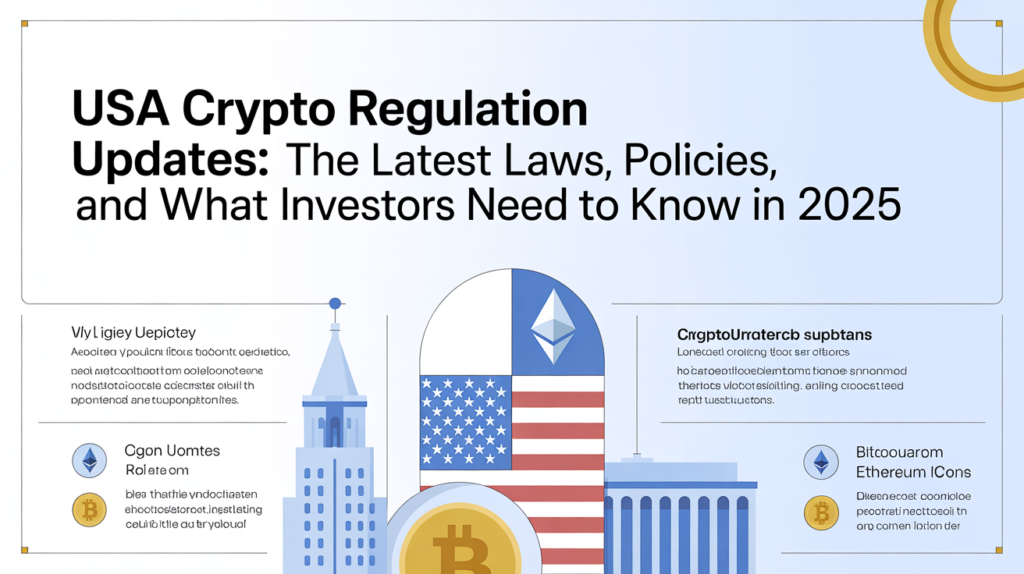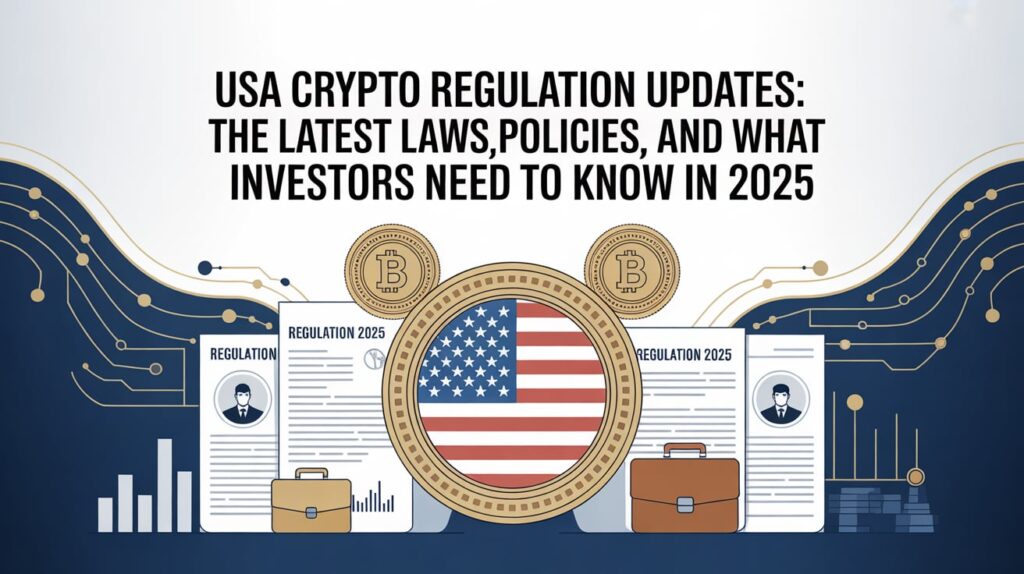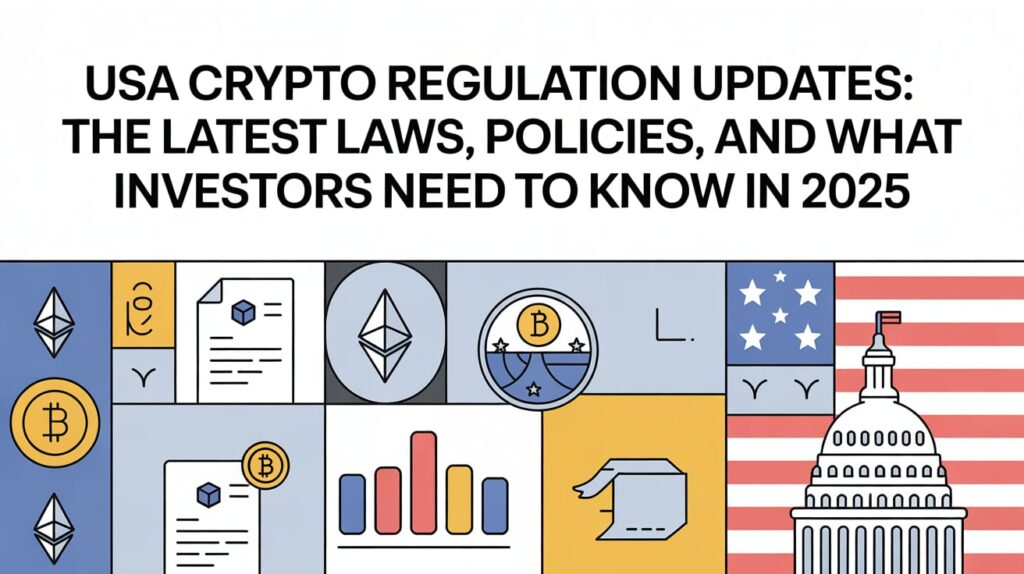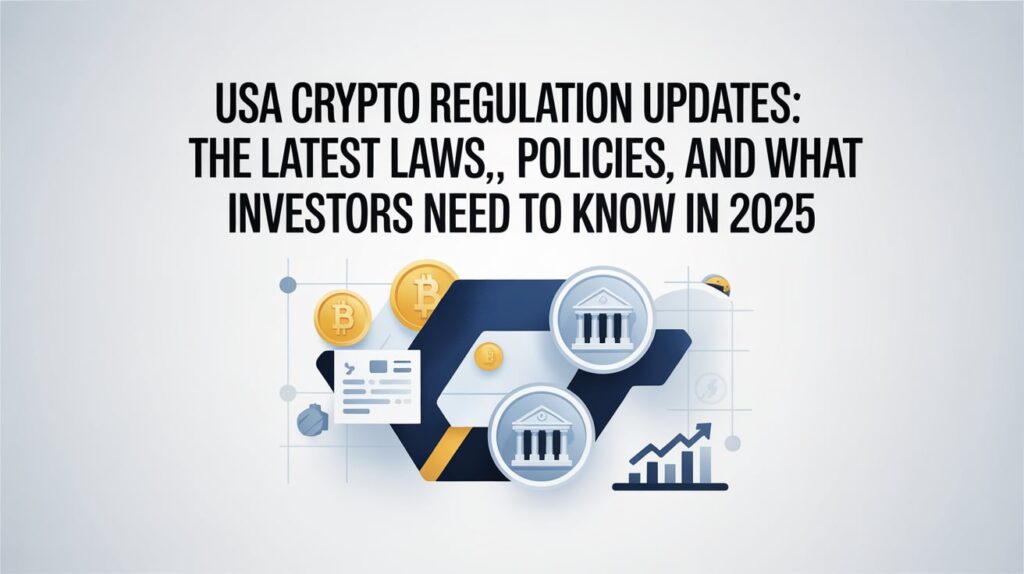USA Crypto Regulation Updates: The Latest Laws, Policies, and What Investors Need to Know in 2025
The year 2025 is proving to be one of the most important milestones for cryptocurrency regulation in the United States. According to BTCMARKETNEWS, the landscape of usa crypto regulation updates is rapidly changing as lawmakers, regulators, and financial institutions work together to establish clarity, consumer protection, and innovation in the crypto economy.
These updates are redefining how digital assets are traded, taxed, and integrated into the mainstream financial system — paving the way for broader adoption while maintaining market stability and transparency.
1. The Current State of Crypto Regulation in the U.S.
For years, the U.S. crypto market operated in a regulatory gray area. Different agencies — the SEC, CFTC, and IRS — often issued overlapping or conflicting rules. But as BTCMARKETNEWS reports, usa crypto regulation updates in 2025 have brought much-needed clarity.
Key Federal Agencies Involved:
-
Securities and Exchange Commission (SEC): Oversees crypto assets classified as securities and enforces investor protection.
-
Commodity Futures Trading Commission (CFTC): Regulates cryptocurrencies considered commodities, such as Bitcoin and Ethereum.
-
Internal Revenue Service (IRS): Handles taxation of crypto earnings, capital gains, and staking rewards.
-
Financial Crimes Enforcement Network (FinCEN): Focuses on anti-money laundering (AML) and know-your-customer (KYC) compliance for exchanges.
Together, these bodies form the backbone of the new regulatory architecture that defines how crypto operates in the U.S.
2. Major USA Crypto Regulation Updates in 2025
a. The Digital Asset Market Structure Act
Passed in early 2025, this landmark legislation defines how cryptocurrencies are classified and traded. It establishes a dual regulatory model, where the SEC governs digital securities and the CFTC oversees commodities.
BTCMARKETNEWS notes that this act finally provides a unified legal framework — ensuring consistency and boosting investor confidence in the U.S. crypto market.
b. Stablecoin Transparency and Reserve Requirements
Stablecoins like USDC and PYUSD are now required to maintain 1:1 collateral backing and submit monthly audits to the Federal Reserve.
This measure ensures that stablecoins maintain liquidity and transparency, preventing risks similar to traditional bank runs. As BTCMARKETNEWS highlights, this is one of the most significant usa crypto regulation updates for safeguarding consumers in the digital dollar era.
c. Crypto Exchange Registration and Compliance
All U.S.-based crypto exchanges must now register with both the SEC and FinCEN. This ensures strict KYC/AML policies and compliance with financial reporting standards.
In addition, exchanges must segregate customer assets, preventing misuse or commingling of funds — a direct response to the collapse of FTX and similar platforms in previous years.
d. Taxation and Reporting Standards
The IRS has implemented new digital asset reporting requirements. Starting in 2025, exchanges and brokers must issue Form 1099-DA, reporting users’ crypto transactions and capital gains.
BTCMARKETNEWS advises investors to maintain clear transaction records and use verified tax reporting tools to stay compliant with the latest usa crypto regulation updates.
e. DeFi and DAO Oversight
The U.S. Treasury now recognizes Decentralized Finance (DeFi) and Decentralized Autonomous Organizations (DAOs) as legitimate financial entities, subject to transparency and anti-fraud standards.
This groundbreaking move allows decentralized projects to operate within a clear legal boundary — while protecting investors from unverified or anonymous scams.
3. The Impact on the Crypto Industry
The recent usa crypto regulation updates are creating both challenges and opportunities:
-
✅ Increased Legitimacy: Clear rules attract institutional investors and corporate adoption.
-
⚖️ Greater Accountability: Exchanges and DeFi platforms must meet higher compliance standards.
-
📈 Market Stability: Regulation reduces volatility caused by uncertainty and speculation.
-
🛑 Higher Operational Costs: Smaller startups face new licensing and auditing expenses.
Despite short-term friction, BTCMARKETNEWS believes that these regulations will ultimately lead to a more transparent and trustworthy U.S. crypto ecosystem.
4. How These Rules Affect Investors
For individual investors, understanding usa crypto regulation updates is critical. Here’s what’s changing:
-
Tax Compliance: Profits from trading, staking, and NFTs are now subject to capital gains tax — even when held on decentralized platforms.
-
Exchange Accountability: Registered exchanges must protect user assets under federal law, offering a safer trading environment.
-
KYC and Privacy: While increased identity verification enhances security, it also raises concerns about data privacy.
-
Access to Institutional Products: Regulation has enabled the creation of Bitcoin and Ethereum ETFs, opening the market to retirement funds and conservative investors.
As BTCMARKETNEWS explains, investors who stay compliant and informed will benefit most from these evolving laws.
5. State-Level Crypto Legislation
Beyond federal policy, individual U.S. states are making progress with crypto-friendly frameworks:
-
Wyoming: Continues to lead with its DAO legal recognition and blockchain banking charters.
-
Texas: Enacts tax incentives for crypto miners using renewable energy.
-
California: Launches a state-backed innovation sandbox for blockchain startups.
-
New York: Updates its BitLicense program to simplify compliance and attract fintech companies.
These localized usa crypto regulation updates demonstrate that crypto governance is no longer one-size-fits-all — it’s becoming tailored to innovation ecosystems.
6. The Global Perspective
The U.S. is aligning its crypto policies with international partners. Collaboration with the EU (MiCA regulation), UK’s FCA, and Japan’s FSA is helping create global regulatory harmony.
According to BTCMARKETNEWS, this cooperation ensures that American exchanges and investors can operate globally without legal ambiguity — giving the U.S. a competitive edge in the global blockchain economy.
7. What’s Next for U.S. Crypto Regulation?
Looking ahead, policymakers plan to focus on three emerging areas:
-
AI and Blockchain Convergence: Establishing ethical and data standards for AI-driven trading bots and on-chain automation.
-
CBDCs (Central Bank Digital Currencies): The Federal Reserve’s “Digital Dollar” pilot is expected to expand by 2026.
-
Consumer Protection: New initiatives will focus on scam prevention and educational awareness campaigns.
BTCMARKETNEWS predicts that the next wave of usa crypto regulation updates will aim to make the crypto industry both innovation-friendly and consumer-centric.
Conclusion
The wave of usa crypto regulation updates in 2025 marks a new era for the digital asset industry. With clearer rules, stronger oversight, and improved investor protection, the U.S. is emerging as a global leader in shaping the future of cryptocurrency regulation.
For investors, this is not the end of freedom in crypto — it’s the beginning of stability, transparency, and legitimacy.
As BTCMARKETNEWS concludes, “Regulation doesn’t kill innovation — it ensures it survives.” The new legal framework will empower responsible players and help the crypto ecosystem evolve into a mature, trusted financial market.
FAQs – USA Crypto Regulation Updates
1. What are the latest USA crypto regulation updates in 2025?
The U.S. has introduced the Digital Asset Market Structure Act, stablecoin reserve rules, and exchange registration mandates to improve oversight and transparency.
2. How do these updates affect crypto investors?
Investors benefit from greater protection and clarity but must comply with stricter reporting and tax obligations.
3. Are DeFi and DAOs now regulated in the U.S.?
Yes, they are recognized as financial entities subject to AML, audit, and transparency requirements.
4. Do these laws apply to foreign exchanges operating in the U.S.?
Yes, any exchange serving U.S. citizens must register and adhere to U.S. compliance standards.
5. Why follow BTCMARKETNEWS for regulation updates?
Because BTCMARKETNEWS provides verified, expert-backed insights and real-time coverage of crypto policies shaping the global digital economy.



